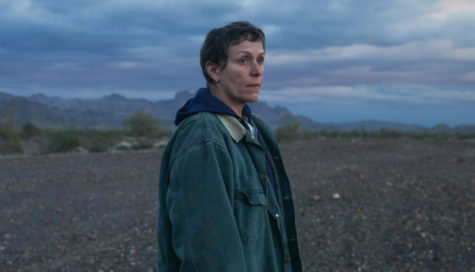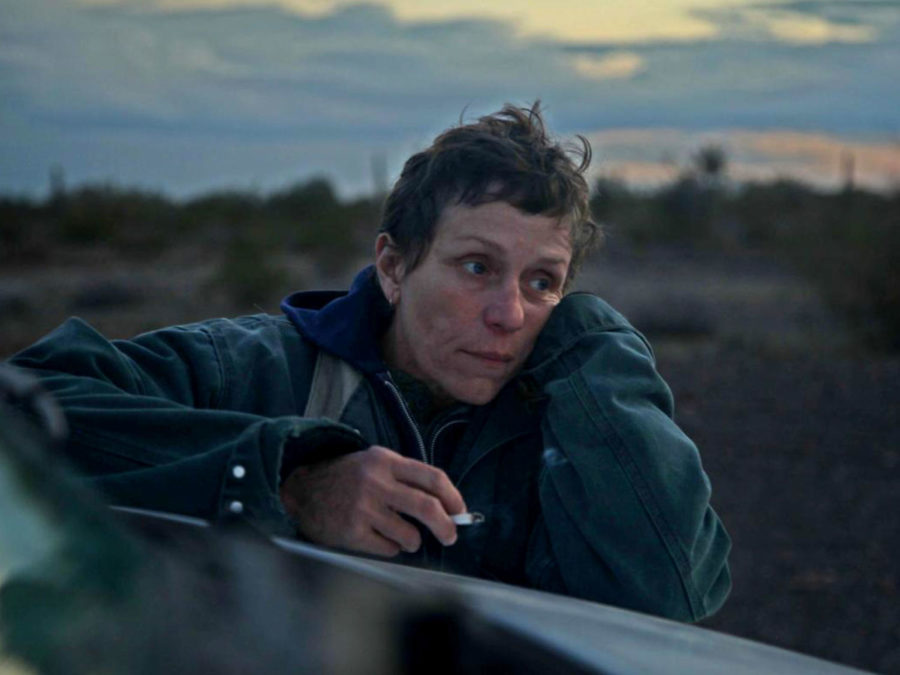“Nomadland” soars to beautiful heights
Director Chloe Zhao’s newest film finds elegance in an isolating story
Photo courtesy of Little White Lies
The leading Best Picture front-runner for 2021, “Nomadland” is one of the most beautiful films of the year.
April 20, 2021
As the 2021 Oscars season heats up, one film stands alone as the frontrunner for taking home Best Picture: “Nomadland.”
Fern (Frances McDormand) lives her life traveling in a trailer, making money by periodically working in Amazon warehouses. She quickly corrects anyone who describes her as “homeless,” preferring the term “houseless” instead. Much like her lack of a permanent residence, she maintains little friendships other than an occasional co-worker she meets.
This deep isolation permeates throughout every detail in director Zhao’s latest film.
Though she travels throughout the western United States over the course of the film, Fern begins in Empire, Nevada — a nightmarish city that had its zip code eliminated. The air of her husband’s death hangs around the barren town, which has almost no open businesses or people living there. Only the gorgeous landscapes pictured on Fern’s journey through the American West—the lush mountains of California, the beautiful deserts of Arizona and the poetic bareness of Nevada — help her from feeling completely alone.
Her journey starts after attending a nomad gathering (full of similar people without houses) organized by Bob Wells (played by himself). She first rejects the support provided by the nomad community, but later decides to meet others on the road. As she does, the van she drives starts to become faulty — causing her to take brief stops for jobs to earn money for repairs. This simple story allows the film to flex its nuanced camerawork, music and acting.

The visual language of the various landscapes speaks volumes — more so than any of the dialogue peppered throughout the film could. Zhao bathes in the magnificence of the locations she films. The cold grayness of Empire explodes into a vast array of colors once Fern drives across the country; it is not difficult to see why she enjoys her time on the road, and the film works as a perfect excuse to show cinematographer Joshua James Richards’ simple and stunning camera work. The film looks beautiful, but it somehow retains an underlying grit that keeps the story grounded in reality, keeping it from becoming a fantastical adventure through the American Wild West.
Equally important to the atmosphere of “Nomadland” is the beautiful musical composition by Ludovico Einaudi. I love the poetic score hanging over the picturesque landscapes: both are so simple and calm, begging the viewer to bask in their beauty. I found no difficulty becoming lost in the visual language of the film accompanied by one of the best scores in recent memory.
Still, despite all its other excellence, McDormand holds the film together with her career-defining performance.
Whether it be arguing with her sister Dolly (Melissa Smith) or conversing with her road-friend and possible love-interest Dave (David Strathairn), McDormand turns in one her best performances ever, one full of subtlety. With a simple half-smile or turn of the head, she says more about her character than many lesser actors could in an entire movie. She perfectly captures an ordinary woman traumatized by her past grief, never fully able to open up to anyone but sociable when she needs to be. The auditory and visual composition of “Nomadland” push the film into heights many films do not reach, but McDormand launches it into another stratosphere. Like both the music and cinematography, her performance is subtle, but I couldn’t help but sit in awe of her acting chops.
Zhao’s contributions to the film cannot be understated — this is her film, her vision. It’s a heartwarming and heart-wrenching story about an ordinary woman; Zhao does not concern herself with dramatized characters, heroic storylines or intense action. “Nomadland” explores the isolation of a displaced woman journeying across the West. Yet, Zhao finds beauty in a simple, grounded story. From the camera work to performances, she litters her film with awe-inspiring moments of beauty that juxtapose the film’s simple premise.
That’s the essential greatness of “Nomadland.” Zhao is trying to find beauty and warmth in a cold and desolate story. Much like how Fern tries to find a connection during her isolating travels, Zhao — through her excellent direction — tries to discover the elegance in a depressing story. It’s almost a perfect movie for the past year: it reflects the struggle to find warmth and compassion in a world strife with turmoil and isolation. If this had come out even five years earlier, I doubt it would have the same impact.
Despite its simple premise and rejection of highly dramatized action, “Nomadland” is one of the most stunning films of recent memory. Gorgeous cinematography and lush music accompany McDormand’s astonishing performance. Zhao’s work of art perfectly explores the human need for compassion and connection but doesn’t undervalue the calmness and simplicity of being alone. I cannot recommend this film enough — it’s one of the best films in recent memory.
5/5 stars








